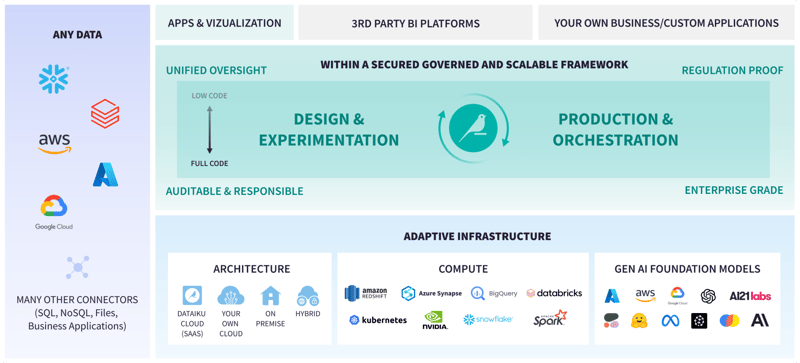Now more than ever, organizations are grappling with a constant influx of information. This "data deluge" presents opportunities for uncovering valuable insights, but traditional data access methods often hinder progress. Siloed data, complex permissions, and inefficient workflows can leave valuable resources untapped.

Traditional Data Access Challenges
Dataiku has allowed us to scale beyond the limitations of desktop or server-based solutions. With its compatibility with our cloud infrastructure and its ability to handle large volumes of data, we have been able to consolidate our data and empower our users to work with it more efficiently.
-Chief Data Scientist at a financial services organization, Forrester Total Economic Impact Study
Despite the importance of data for businesses, many organizations still struggle with the following issues when it comes to data access:
Silos and Fragmentation
One of the primary obstacles to effective data access is the presence of data silos within organizations. Departments often operate in isolation, leading to fragmented datasets scattered across various systems and platforms. This fragmentation impedes collaboration and decision-making, as accessing relevant data becomes a cumbersome and time-consuming process.
Complexity and Technical Barriers
Traditional data access methods often require technical expertise in SQL and APIs, making it challenging for non-technical users to extract meaningful insights. Complex data structures, disparate formats, and incompatible systems further exacerbate this issue, leading to frustration and inefficiency among data users. On the flip side, those with the technical expertise to share access to these datasets like data engineers, often don't have the business context needed to understand the data.
Security and Governance Concerns
Ensuring data security and compliance with regulatory standards is a critical concern for organizations across industries. The technical complexity of some data access approaches may increase day-to-day practices like sharing data in ways that aren’t governable or easily monitored. These methods often bypass robust security measures, leaving sensitive information vulnerable to breaches and unauthorized access. Additionally, maintaining data governance and integrity becomes increasingly challenging as data volumes grow and regulatory requirements evolve.
These challenges can prevent businesses from fully capitalizing on their data.
Streamlined Data Access in Dataiku
Dataiku make data access more efficient by providing an infrastructure-agnostic, centralized platform that offers several key advantages:- Unified Access Point: Dataiku manages secure, centralized connections to your data systems, integrating seamlessly with dozens of leading data sources both on-premises and in the cloud. Regardless of size, shape, or location, you can access all your data from one place, eliminating the time and effort of navigating through disparate systems. Pre-built connectors streamline the connection process for IT administrators.
- Enhanced Security: Dataiku prioritizes data security with features like role-based access control, encryption, and activity logging. You can control who has access to data, monitor how it's being used, and ensure compliance with data regulations. With a user-friendly interface, IT can easily manage permissions, ensuring data security while enabling collaboration.
- Streamlined Workflows: The data catalog enables quick access to prepared datasets across the organization. This allows data scientists and analysts to focus on analysis and insights generation rather than spending time on repetitive data wrangling processes.
By improving data access with Dataiku, organizations:
Unlock the Value of Data: With data readily available and easily accessible, businesses can uncover hidden insights, improve decision-making, and fuel innovation across all departments.
Boost Productivity: Streamlining workflows frees up valuable time for data scientists and analysts, allowing them to focus on higher-level tasks like analysis, model building, and visualization.
A recent Forrester Total Economic Impact™ of Dataiku shows that over 70% time saved for data scientists and data engineers on data analysis and extraction using Dataiku. As well as 80% time savings on manual processes realized in year 3.
Foster Collaboration: Secure and controlled access for different user groups fosters a collaborative environment where teams can share insights and accelerate time to value.
 Dataiku integrates natively with elastic cloud storage and compute from leading providers.
Dataiku integrates natively with elastic cloud storage and compute from leading providers.
Remote Compute & Data Access
Analytics processing often happens on the computer of the data scientist running the analysis. For larger projects, the processing might occur on a shared server architecture. This requires applications to be installed on the server to: handle requests, create job queues, run jobs, and notify users of completion, transfer data, and more. The architecture also adds IT complexity with access roles and server maintenance. Moving the application to a cloud server does not change the fundamental limitations of this software architecture. Dataiku solves this limitation by delivering a different approach.
Whether data is structured, semi-structured, or unstructured, users can choose the most effective engine (local, in-database, or Spark). Pushdown workloads can be executed efficiently in elastic cloud compute clusters or in-database. Getting value from AI requires the right scaling options and the right design elements for each stage of the life cycle. Dataiku enables various approaches to technical scale at each stage.
Advantages of Pushdown Architecture
Dataiku uses a unique pushdown architecture that allows organizations to take advantage of existing, elastic, and highly scalable computing systems including SQL databases, Spark, Kubernetes, and more. Benefits of Dataiku’s architecture include:
- Scalability: Large data projects can be inherently fluid, requiring compute resources that scale up or down based on project needs. Pushdown architecture allows you to leverage the seemingly limitless scalability of cloud platforms. You can provision additional resources as your analysis progresses or easily scale down when the job is complete, optimizing costs and resource utilization.
- Cost-Effectiveness: Legacy analytics tools struggle to harness the power of cost-effective cloud environments, hindering teams from utilizing new cloud resources and budgets. As a modern analytics platform, Dataiku integrates with AWS, Azure, GCP, Snowflake, and Databricks computing to take full advantage of cloud resources.
- Faster Time to Insights: Pushdown execution leverages the high-performance computing power offered by cloud providers, significantly speeding up analysis workflows. This translates to faster turnaround times for your machine learning models, allowing you to gain insights from your data more quickly.
- Optimized Use of Cutting-Edge Hardware: Graphical Processing Units (GPUs) can dramatically accelerate certain types of model training, especially deep learning and large language or Generative AI models. Dataiku supports the use of both CPUs and GPUs for model training. This allows you to leverage the most powerful hardware available without the need for expensive upfront investments.
- Simplified Infrastructure Management: Managing the provision and deprovision of resources for individual jobs is time-consuming. The complexities of Spark, Kubernetes, and clusters requires specialized expertise. Pushdown execution removes this burden, as cloud providers handle the underlying infrastructure management, freeing up your IT team to focus on core business objectives.
Dataiku empowers businesses to overcome the traditional challenges of data access by providing a unified platform, streamlined workflows, and robust security features. With Dataiku, organizations can unlock the full potential of their data, fostering a data-driven culture and achieving significant business value.




